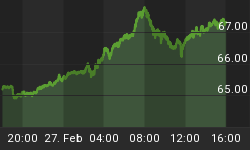The World Cup, every four years, helps to remind us that the world is still a very big place, even though electronic media have made it seem so much smaller. And yet, it seemed this morning that equity investors did not realize this lesson. Over the weekend, the Chinese central bank had declared an intent to loosen the bands in which the currency is permitted to float against the USD. Since late 2008, the CNY had essentially been fixed against the greenback after having experienced a managed float since late 2005. Over 2005-2008, the dollar had appreciated around 18%, but during the crisis the Chinese (arguably, somewhat wisely) decided to control one of the variables that were actually under their control.
Equity markets soared overnight on the theory that a weaker yuan meant better export conditions for all nations that sell stuff to the Chinese; therefore, growth will improve. It follows that stocks ought to be streaking higher, right?
Gee, the theory makes some sense, especially for the countries that sell a great deal to China. But the U.S. dollar has appreciated 25% against the Euro over the last six months, and this country does vastly more business with Europe than with China. Exports to China in 2009 were about $70bln; exports to Europe were $258bln (source: US Census Bureau, Foreign Trade Division). And somehow, the stock market hadn't been rallying in a dizzying fashion lately, in case you'd not noticed.
The bottom line is that we don't really know exactly what the magnitude of the impact will be, and over what time period, and frankly we don't even know how much the Chinese will let the currency appreciate. Making an investing decision on the basis of this information is pretty optimistic. But investors, noticing the appreciating indices, figured the other guy must know what the magnitude of the impact is, and placed orders accordingly.
The capital losses will sting no less for the reason that someone else is losing money as well. Stocks ended the day with a decline, the S&P -0.4% and below Friday's low. Volume was again light. Still, equities haven't done anything wrong since the breakout from the "double bottom," so we're all still watching and waiting.
Bonds recovered from a deep overnight selloff to end up with a loss on the TYU0 of only 3.5/32nds (10y yield at 3.24%). Inflation markets did reasonably well, with breakevens up 2-3bps despite a nearly-unchanged market.
Despite the reasonably wide range, trade was relatively lethargic. With Existing Home Sales (Consensus: 6.12mm from 5.77mm) tomorrow (along with the Richmond Fed Manufacturing Index, expected to decline to 20 from 26), New Home Sales and the FOMC announcement the next day, Durables Goods, and Initial Claims ahead, investors were content to spend another day learning other lessons from the World Cup. Useful things, such as the international signs for "Oh my God, I think my leg is going to fall off, did you see that?" and "You're crazy, I didn't touch him, he's faking."
However, I want to point out one thing that was recently brought to my attention. I've noted recently that the question of whether we are entering a double-dip recession is clouded in my mind by the question of whether we ever got out of the first dip; when we look back at the behavior of the economy during the teeth of the crisis, we tend to relate the current level of activity to the level of activity at the nadir, and of course things look better. It's difficult to mentally compare things to how they were before the Lehman bankruptcy, and frankly a little hard to compare current activity to activity say, six months ago.
I usually ignore the ECRI index. It was created to be an "improved Leading Indicators" index that is released weekly. Look at the chart below (Source: Bloomberg). It was astonishing to me to see the plunge it has taken recently...and I am not exactly an economy bull.

I was a little surprised to see the deep current dip in the ECRI
I included a long history for your reference, and chose a logarithmic axis so that you can get a sense for the severity of the swings. The current decline, if it had not followed so closely on the heels of the 2008-09 crisis, would be easily setting off alarm bells. The dip is comparable to the dips after the '87 crash (which we know didn't presage a recession), at the beginning of the recession of the early 1990s, and at the beginning of the first recession of the 'Aughts.
We have seen a number of indicators weakening, but we have all tended to downplay the severity of these pullbacks because of the context of the really deep dip we are just coming off of. But this index suggests we should look deeper, or perhaps look wider: it suggests that we may well be soon heading into a contraction of business that, in the context of any economy other than that of the last two years, would be considered a recession.
If you've just recently had your car rammed by a Hummer, perhaps you don't feel as bad when it is later smacked by a VW beetle. But you're still taking it to the shop.















